PORTLAND, Ore. — Kids and teens are currently in a mental health crisis. While many factors are at play, social media is under a microscope right now. The U.S. Surgeon General issued an advisory about the effects social media has on youth mental health.
“What we have been seeing is a significant trend of individuals who are in crisis, that feel deeply alone and feel as though there’s nobody who understands who they are,” Dr. Caroline Fenkel of Charlie Health said.
Fenkel is the co-founder and chief clinical officer for Charlie Health, which offers personalized intensive mental healthcare to teens and young adults.
“What we’re seeing a lot of has to do with this idea of self-harm, and the idea of so much self-hatred — and I think that kind of leans into the social media aspect of things,” she said.
The surgeon general’s advisory points to research showing that children and adolescents who spend more than three hours a day on social media face double the risk of mental health problems — including depression and anxiety.
Which is a big concern because a recent survey shows that teenagers spend an average of 3.5 hours a day on social media. The advisory also points out that the impact is different for everyone.
“There’s certain individuals who — social media has been a lifeline for them, it’s something that they’ve been able to create meaningful relationships, where they can practice healthy decision making,” Fenkel said. “And then there’s individuals who utilize social media like an addiction — who are awake until 2 a.m., who look at those different types of body types or ways to self-harm.”
How to address youth mental health
So, how do you know if your child is struggling with the impacts of social media?
It starts with open and judgment-free conversations, according to Fenkel.
“First and foremost: no judgment. That is so key,” she said. “Asking questions, staying curious, and saying something like, ‘ya know, I noticed that when you got off your phone you were a little bit sad. I’m just curious what’s going on.’ And start the discussion by asking questions and then listen."
"No, do not — whatever you do — do not lecture. Listen, ask questions. Listen, ask questions.”
Monitor your child or teen’s mood before and after they’re on social media. If there’s a significant shift, that may be a good place to start the conversation.
Pay attention to how your child is functioning overall.
“Being able to ask yourself: Are they sleeping? Are they eating? Are their grades declining? Are they showing up for school? Are they showing up for work? Is this getting in the way of their daily routines,” Fenkel said.
Finally, and this is a big one, Fenkel said parents and guardians need to model healthy behavior with their own social media and phone use.
“One of the things I’m always talking to parents about is: If you want your kid to get off of their phone, you need to get off your phone — bottom line.”
That could mean having a technology-free night with the family and acknowledging your own over-use. The important thing is to be vulnerable and self-aware.
“That looks like saying to your kid when you get home you’re both sitting on your phones, scrolling — looking at your kid and saying, ‘I’m really sick of looking at my phone. Do you want to go for a walk?’”
The social media boundaries and mental health conversations will look different depending on each child.
If you think your child might benefit from professional mental health care, an excellent place to start is with your primary care physician.
Find more resources from Charlie Health at charliehealth.com.

